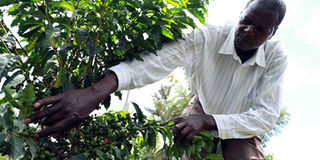Kiambu farmland shouldn’t be turned into concrete wasteland

A farmer tends to his coffee plantation. Today, most of the coffee plantations in Kiambu County are gone. PHOTO | FILE | NATION MEDIA GROUP
What you need to know:
- People, mainly outsiders, are buying up huge tracts of land with the singular aim of building mini-cities and gated estates whose houses only the upper echelons of society can afford.
- It is obvious that unless ways are found to save the remaining arable land, there will be little left for even subsistence farming.
In my youth, I used to envy those who regularly trooped each morning to the huge coffee plantations mostly owned by white farmers, and later, by the new political and business elite who eventually bought the farms.
The young ones among them used to regale us with tales of how much they earned for picking coffee, especially how they gorged on mandazi and samosas hawked there, hence the envy.
My parents wouldn’t allow us to go pick coffee in the plantations when our own much smaller farm went unattended.
In our view, this was unfair, and things got worse when President Jomo Kenyatta decreed those workers must be transported to and from the plantations.
It seemed like we were missing all the glamour in life and the resentment built up until we understood that we were actually being educated with the proceeds from the crop we slaved on every Saturday.
That was when we realised the workers were being grievously exploited, but at least those farms provided jobs.
REAL ESTATE
Today, most of the coffee plantations in Kiambu County are gone, many subdivided into small plots in which houses have sprang up.
Those used to be the plantations bought by land-buying companies, and this didn’t matter too much because, at least, many people who had no shelter now owned their own plots and built their own houses.
But the sad thing is that the trend of turning fertile land into concrete did not stop there. Today, the only growth industry in Kiambu seems to be real estate.
People, mainly outsiders, are buying up huge tracts of land with the singular aim of building mini-cities and gated estates whose houses only the upper echelons of society can afford.
The unfortunate thing is that they are, seemingly, being encouraged to do so by the county government for unstated reasons.
FARMING
The result is that arable land which was already scarce, is now being gobbled up by real estate investors at an alarming rate for the benefit of very few.
This is a dangerous trend which, unless checked, will have very serious ramifications.
Of course, coffee farming has over the years lost its lustre in many parts of the country, not just Kiambu.
There is very little profit in it, labour costs have gone over the roof, the cost of inputs and pesticides have become prohibitive, and lack of value addition has become a major hindrance.
As a result, nobody should really fault the estates owners for selling then and making a healthy profit instead of waiting for global market prices to rise because frost has destroyed Brazilian coffee.
According to statistics, nine years ago, agricultural activity accounted for 17.4 percent of Kiambu’s income.
POPULATION
This percentage was, of course, expected to go down over time considering that the population was rising inexorably and the parcels of arable land dwindling.
What that means is that as cash-crop production goes down, eventually, the county will be unable to feed itself even as the sources of employment steadily dry up.
This is a recipe for disaster. As someone cynically observed, at this rate, Kiambu people will one day feed on concrete.
Even disregarding the hyperbole, it is obvious that unless ways are found to save the remaining arable land, there will be little left for even subsistence farming.
In a willing-buyer willing-seller situation, nobody can be stopped from buying land and building houses on it, but in the interest of the poor who are the majority, a moratorium should be slapped on this happy-go-lucky capitalism.
FOOD AID
This may require tweaking the county’s land-use policies or reforming them altogether. If this is not done urgently, Kiambu people may one day be forced to rely on perennial food aid, or to import maize from Makueni County.
Incidentally, it was interesting to learn from Kiambu Governor Ferdinand Waititu what he intends to do with 200 of the 635 acres ceded by the international pineapple grower Delmonte in Thika.
While the details of the negotiations are still unclear, it seems the land will be used for an airstrip that should, presumably, rival Wilson Airport.
Up to now, nobody appears to have taken that strange statement seriously enough to comment on it.
PRIORITY
While it may be deeply satisfying to boast that Kiambu County also has an airstrip, an indicator of “development” — although Thika is barely 30 kilometres away from the JKIA and Wilson airport — this, surely, cannot be a priority for people who suffer from so much land stress that they periodically get murdered in their sleep for owning a few acres in parts of Rift Valley.
Mr Governor, how about arranging to sell parcels of the Delmonte land to the landless in your county, or better still, seeking ways to build value addition and extraction factories there to improve the lot of small farmers?
The 900,000 plus voters who elected you did not do it so that you can serve a tiny minority of the very rich, the only people who can actually benefit from an airstrip in their locality.
Ngwiri is a consulting editor [email protected]





